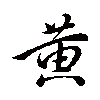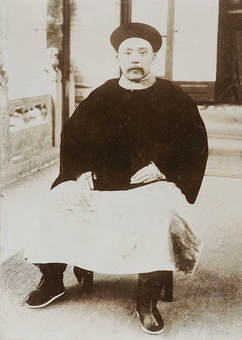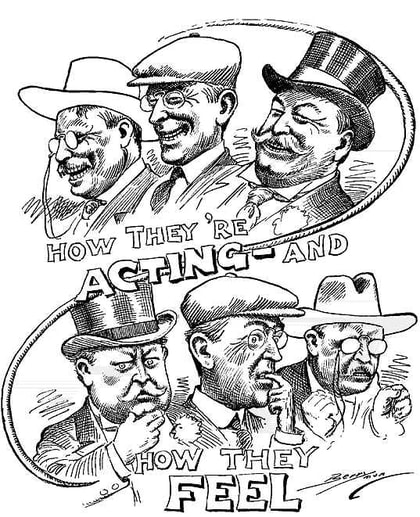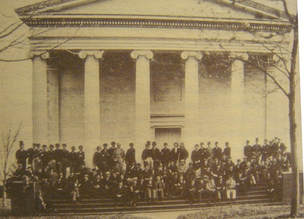In Wilson's Footsteps
Presidential Election, 1912 & Transfer From Michigan to Princeton, 1913
|
As China wrestled with its new status as a republic, it appears that Han Liang fell under the spell of Woodrow Wilson, who was elected President of the United States in November 1912.
In the fall of 1912, Han Liang was a sophomore at Michigan. Meanwhile, back in China, President Yuan Shikai, who had been in office for barely more than half a year, was already trying to expand the powers of his role. At the same time, emerging parties and politicians were preparing for the Republic of China's first-ever elections to a new National Assembly. Sun Yat-sen's "Tongmenghui" or Revolutionary Alliance and several small groups would win a majority of seats in the Assembly under the coalition "Nationalist Party" name or "Kuomintang" (國民黨 Guomindang, also KMT or GMD). |
|
With China’s new political system still in flux, it’s assumed that Han Liang embraced the opportunity to follow a US presidential campaign at close range. We know that another Boxer Indemnity scholar in the US did so. If he and Han Liang had not yet met or did not cross paths at the Chinese Students’ Alliance conference in Ithaca in 1914, we know they were acquainted by 1915. This scholar was Hu Shih (胡適 Hu Shi). He was a year ahead of Han Liang at Cornell and had also abandoned a practical major, switching from agriculture to philosophy. Hu was destined to soon become one of China’s most influential writers and thinkers. He would write in his memoirs that in 1912 he threw his support behind Teddy Roosevelt, who was in a come-back bid for the presidency at the head of the Progressive or “Bull Moose” Party. He did this as a way to learn more about the US and to cultivate an enthusiasm for public affairs that he could take back to China.
It appears that Han Liang did something similar, though siding with the Democratic nominee Woodrow Wilson, the Governor of New Jersey and a former president of Princeton University. The 1912 elections were a particularly exciting four-way contest among Wilson, Roosevelt, sitting president William Howard Taft on the Republican ticket, and a Socialist candidate. Wilson emerged the winner, in part because Roosevelt and Taft split the traditional Republican vote. |
It isn’t difficult to see why Wilson might have been attractive to Han Liang. Unlike Roosevelt, Hu’s choice, who cultivated an image as an outdoorsman and adventurer, Wilson was the consummate scholar, a long-time professor who had written textbooks on the American political system. His dual accomplishments as an academic and a politician would have matched nicely with the Chinese ideal of the “scholar-official” – a person both learned and of service to his country. Moreover, a great many of the goals of the Progressive Movement that Wilson had helped to define would have seemed hugely relevant to China’s political and social needs at the time, be it eliminating corruption from government, breaking up business monopolies, or using science to improve the lives of the less fortunate.
|
In 1913, within a few months of Wilson taking office, it seems that Han Liang was able to turn admiration into action. He transferred to Princeton, where Wilson had been a student as well as university president. Han Liang also joined the American Whig Society, a venerable debating organization that Wilson had also belonged to and where Wilson had honed his speaking skills. Upon his graduation, as a member of Whig Hall, Han Liang would receive a diploma signed by Wilson. Half a century later, when asked to state his political affiliation for his reunion report, Han Liang defaulted to the allegiance of his youth, which was "Democrat".
|
Interestingly, another young man also coming to Princeton in 1913 from the Midwest (albeit by way of an Eastern boarding school) was future author of The Great Gatsby F. Scott Fitzgerald. There is no evidence that he and Han Liang met or were acquainted in any way. But this writer's preoccupation with privilege and acceptance reminds us of the world that Han Liang was throwing himself into by joining the Ivy League.
SOURCES
|
Hu Shih's support of Roosevelt and interest in politics:
Whig student diplomas signed by President Wilson:
|
Affiliation as a Democrat:
|



